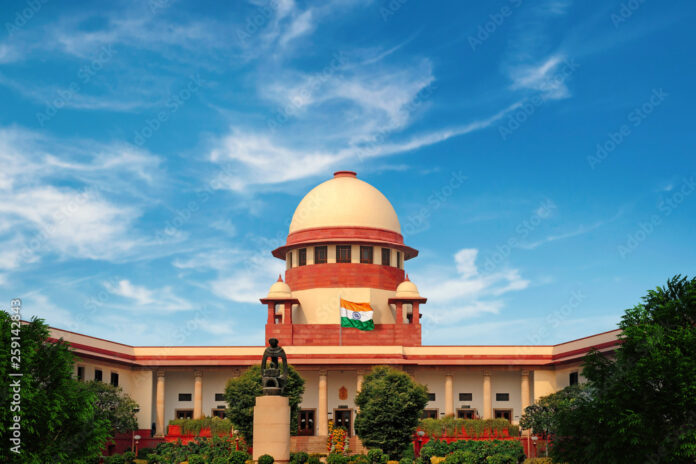The Supreme Court of India has established that when there are significant contradictions between the opinion of a Medical Jurist and eyewitness testimony, the latter should generally be prioritized. However, if the medical evidence overwhelmingly contradicts the eyewitnesses’ accounts, especially if the witnesses are biased or interested parties, the court should be cautious in accepting the eyewitness testimony over convincing medical opinions. This clarification was made by Justices B R Gavai and Sandeep Mehta.
Acquittal of Police Officers in Custodial Death Case
The court acquitted Police Inspector Vinod Jaswantray Vyas and Superintendent of Police Chinubhai Govindbhai Patel, who were accused in the custodial death case of bootlegger Jeeva in June 1992. Initially convicted by an Ahmedabad trial court in 1997 and sentenced to life imprisonment, their conviction was later reduced by the Gujarat High Court to Section 304 Part I IPC. Despite the death of both officers during the appeal process, their legal heirs continued the appeals.
Doubts on Eyewitness Credibility
The prosecution’s case relied heavily on the testimonies of Jeeva’s two sisters, who claimed custodial torture led to Jeeva’s death. The court noted that Jeeva had a history of criminal activity, including bootlegging and detention under the Gujarat Prevention of Anti-Social Activities Act, 1985. The sisters’ claim that only Jeeva was tortured, while co-accused Anna Dorai was unharmed, raised doubts about their credibility.
Importance of Prompt Legal Action
The court highlighted the unnatural conduct of the sisters, who did not immediately report the alleged torture to higher officials or courts, despite being familiar with the legal system. The delay of 20 days in filing the complaint further weakened their testimony. Additionally, the failure to examine an advocate who was present during Jeeva’s surrender raised suspicions about the completeness and truthfulness of the prosecution’s case.
Medical Evidence as Key Factor
Jeeva died 36 hours after his surrender, making the medical evidence crucial. The Medical Jurist’s autopsy revealed fresh injuries, which suggested they occurred within six to eight hours of death. This contradicted the sisters’ claims of sustained torture. The court also noted that if Jeeva had been severely injured as claimed, his pain would have been evident to the DCP and the Magistrate, which was not the case.
Possibility of Injury in Jail
The presence of red dust on Jeeva’s clothes, typical of the Sabarmati Central Jail, supported the possibility that he was assaulted by co-prisoners. The court criticized the investigating agency for not thoroughly investigating the prison authorities to rule out this possibility.
Lack of Motive for Custodial Torture
The court found no convincing motive for the police officers to single out Jeeva for torture while sparing Anna Dorai. Jeeva’s prior criminal record alone was insufficient to establish a motive for the alleged custodial violence.
The court concluded that the prosecution failed to present cogent, convincing, and reliable evidence to prove the guilt of the accused officers. Consequently, the Supreme Court set aside the judgments of the trial court and the High Court, acquitting Vinod Jaswantray Vyas and Chinubhai Govindbhai Patel.
the latter should generally be prioritized. However, if the medical evidence overwhelmingly contradicts the eyewitnesses’ accounts, especially if the witnesses are biased or interested parties, the court should be cautious in accepting the eyewitness testimony over convincing medical opinions. This clarification was made by Justices B R Gavai and Sandeep Mehta.
Acquittal of Police Officers in Custodial Death Case
The court acquitted Police Inspector Vinod Jaswantray Vyas and Superintendent of Police Chinubhai Govindbhai Patel, who are accused in the custodial death case of bootlegger Jeeva in June 1992. Initially convicted by an Ahmedabad trial court in 1997 and sentenced to life imprisonment, their conviction was later reduced by the Gujarat High Court to Section 304 Part I IPC. Despite the death of both officers during the appeal process, their legal heirs continued the appeals.
Doubts on Eyewitness Credibility
The prosecution’s case relied heavily on the testimonies of Jeeva’s two sisters, who claimed custodial torture led to Jeeva’s death. The court noted that Jeeva had a history of criminal activity, including bootlegging and detention under the Gujarat Prevention of Anti-Social Activities Act, 1985. The sisters’ claim that only Jeeva was tortured, while co-accused Anna Dorai was unharmed, raised doubts about their credibility.
Importance of Prompt Legal Action
The court highlighted the unnatural conduct of the sisters, who did not immediately report the alleged torture to higher officials or courts, despite being familiar with the legal system. The delay of 20 days in filing the complaint further weakened their testimony. Additionally, the failure to examine an advocate who was present during Jeeva’s surrender raised suspicions about the completeness and truthfulness of the prosecution’s case.
Medical Evidence as Key Factor
Jeeva died 36 hours after his surrender, making the medical evidence crucial. The Medical Jurist’s autopsy revealed fresh injuries, which suggested they occurred within six to eight hours of death. This contradicted the sisters’ claims of sustained torture. The court also noted that if Jeeva had been severely injured as claimed, his pain would have been evident to the DCP and the Magistrate, which was not the case.
Possibility of Injury in Jail
The presence of red dust on Jeeva’s clothes, typical of the Sabarmati Central Jail, supported the possibility that he was assaulted by co-prisoners. The court criticized the investigating agency for not thoroughly investigating the prison authorities to rule out this possibility.
Lack of Motive for Custodial Torture
The court found no convincing motive for the police officers to single out Jeeva for torture while sparing Anna Dorai. Jeeva’s prior criminal record alone was insufficient to establish a motive for the alleged custodial violence.
The court concluded that the prosecution failed to present cogent, convincing, and reliable evidence to prove the guilt of the accused officers. Consequently, the Supreme Court set aside the judgments of the trial court and the High Court, acquitting Vinod Jaswantray Vyas and Chinubhai Govindbhai Patel.


